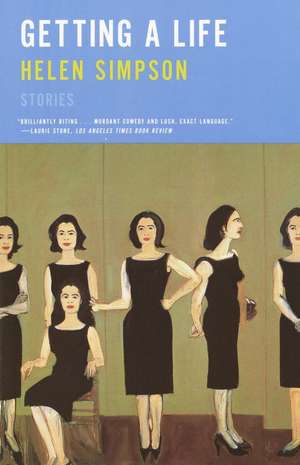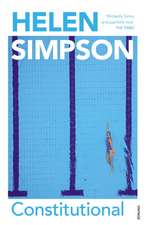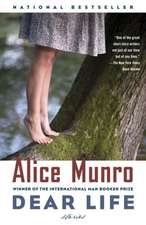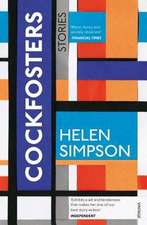Getting a Life: Stories: Vintage Contemporaries
Autor Helen Simpsonen Limba Engleză Paperback – 31 mai 2002
An ambitious teenager vows never to settle for any of the adult lives she sees around her. Two old friends get tipsy at a small cafe and end up revealing more than they intended. In a boutique so exclusive that entrance requires a password, a frazzled careerwoman explores the anesthetizing effect of highly impractical clothing. And in the mesmerizing title story, a mother of three takes life one day at a time, while pushing the ominous question of whether she wants to firmly to one side.
Din seria Vintage Contemporaries
-
 Preț: 109.95 lei
Preț: 109.95 lei -
 Preț: 101.80 lei
Preț: 101.80 lei -
 Preț: 96.52 lei
Preț: 96.52 lei -
 Preț: 107.46 lei
Preț: 107.46 lei -
 Preț: 91.77 lei
Preț: 91.77 lei -
 Preț: 100.35 lei
Preț: 100.35 lei -
 Preț: 111.51 lei
Preț: 111.51 lei -
 Preț: 96.11 lei
Preț: 96.11 lei -
 Preț: 96.93 lei
Preț: 96.93 lei -
 Preț: 97.34 lei
Preț: 97.34 lei -
 Preț: 111.92 lei
Preț: 111.92 lei -
 Preț: 117.87 lei
Preț: 117.87 lei -
 Preț: 113.56 lei
Preț: 113.56 lei -
 Preț: 101.88 lei
Preț: 101.88 lei -
 Preț: 108.09 lei
Preț: 108.09 lei -
 Preț: 115.42 lei
Preț: 115.42 lei -
 Preț: 106.04 lei
Preț: 106.04 lei -
 Preț: 119.87 lei
Preț: 119.87 lei -
 Preț: 90.64 lei
Preț: 90.64 lei -
 Preț: 87.84 lei
Preț: 87.84 lei -
 Preț: 99.60 lei
Preț: 99.60 lei -
 Preț: 105.41 lei
Preț: 105.41 lei -
 Preț: 99.30 lei
Preț: 99.30 lei -
 Preț: 120.26 lei
Preț: 120.26 lei -
 Preț: 103.74 lei
Preț: 103.74 lei -
 Preț: 100.98 lei
Preț: 100.98 lei -
 Preț: 100.76 lei
Preț: 100.76 lei -
 Preț: 89.19 lei
Preț: 89.19 lei -
 Preț: 115.94 lei
Preț: 115.94 lei -
 Preț: 101.24 lei
Preț: 101.24 lei -
 Preț: 125.13 lei
Preț: 125.13 lei -
 Preț: 89.50 lei
Preț: 89.50 lei -
 Preț: 132.88 lei
Preț: 132.88 lei -
 Preț: 139.63 lei
Preț: 139.63 lei -
 Preț: 93.85 lei
Preț: 93.85 lei -
 Preț: 106.45 lei
Preț: 106.45 lei -
 Preț: 89.91 lei
Preț: 89.91 lei -
 Preț: 107.92 lei
Preț: 107.92 lei -
 Preț: 77.02 lei
Preț: 77.02 lei -
 Preț: 125.21 lei
Preț: 125.21 lei -
 Preț: 99.75 lei
Preț: 99.75 lei -
 Preț: 112.11 lei
Preț: 112.11 lei -
 Preț: 83.94 lei
Preț: 83.94 lei -
 Preț: 97.15 lei
Preț: 97.15 lei -
 Preț: 105.82 lei
Preț: 105.82 lei -
 Preț: 87.13 lei
Preț: 87.13 lei -
 Preț: 111.76 lei
Preț: 111.76 lei -
 Preț: 129.78 lei
Preț: 129.78 lei -
 Preț: 100.57 lei
Preț: 100.57 lei
Preț: 95.92 lei
Nou
Puncte Express: 144
Preț estimativ în valută:
18.36€ • 19.09$ • 15.15£
18.36€ • 19.09$ • 15.15£
Carte disponibilă
Livrare economică 24 martie-07 aprilie
Preluare comenzi: 021 569.72.76
Specificații
ISBN-13: 9780375724978
ISBN-10: 0375724974
Pagini: 208
Dimensiuni: 132 x 204 x 14 mm
Greutate: 0.22 kg
Ediția:00002
Editura: Vintage Publishing
Seria Vintage Contemporaries
ISBN-10: 0375724974
Pagini: 208
Dimensiuni: 132 x 204 x 14 mm
Greutate: 0.22 kg
Ediția:00002
Editura: Vintage Publishing
Seria Vintage Contemporaries
Notă biografică
Helen Simpson lives in London.
Extras
GOLDEN APPLES
Jade Beaumont was technically up in her bedroom revising for the exams which were now only weeks away. Her school gave them study days at home, after lectures on trust and idleness. She was supposed to be sorting out the differences between Wordsworth and Coleridge at the moment.
Down along the suburban pleasantness of Miniver Road the pavements were shaded by fruit trees, and the front gardens of the little Edwardian villas smiled back at her with early lilac, bushes of crimson flowering currant and the myopic blue dazzle of forget-me-nots. She felt light on her feet and clever, like a cat, snuffing the air, pinching a pungent currant leaf.
There was a belief held by Jade’s set that the earlier you hardened yourself off and bared your skin, the more lasting the eventual tan; and so she had that morning pulled on a brief white skirt and T-shirt. She was on her way to an interview for a holiday job at the garden center. Summer! She couldn’t wait. The morning was fair but chilly and the white-gold hairs on her arms and legs stood up and curved to form an invisible reticulation, trapping a layer of warm air a good centimeter deep.
I may not hope from outward forms to win
The passion and the life, whose fountains are within.
That was cool, but Coleridge was a minefield. Just when you thought he’d said something really brilliant, he went raving off full steam ahead into nothingness. He was a nightmare to write about. Anyway, she herself found outward forms utterly absorbing, the color of clothes, the texture of skin, the smell of food and flowers. She couldn’t see the point of extrapolation. Keats was obviously so much better than the others, but you didn’t get the choice of questions with him.
She paused to inhale the sweet air around a philadelphus Belle Etoile, then noticed the host of tired daffodils at its feet.
Shades of the prison-house begin to close
Upon the growing boy,
But he beholds the light, and whence it flows,
He sees it in his joy.
he looked back down her years at school, the reined-in feeling, the stupors of boredom, the teachers in the classrooms like tired lion-tamers, and felt quite the opposite. She was about to be let out. And every day when she left the house, there was the excitement of being noticed, the warmth of eye-beams, the unfolding consciousness of her own attractive powers. She was the focus of every film she saw, every novel she read.
She was about to start careering round like a lustrous loose cannon.
Full soon thy soul shall have her earthly freight,
And custom lie upon thee with a weight,
Heavy as frost, and deep almost as life!
She was never going to go dead inside or live somewhere boring like this, and she would make sure she was in charge at any work she did and not let it run her. She would never be like her mother, making timetables and lists and endless arrangements, lost forever in a forest of twitching detail with her tense talk of juggling and her self-importance about her precious job and her joyless “running the family.” No, life was not some sort of military campaign; or, at least, hers would not be.
When she thought of her mother, she saw tendons and hawsers, a taut figure at the front door screaming at them all to do their music practice. She was always off out; she made them do what she said by remote control. Her trouble was, she’d forgotten how to relax. It was no wonder Dad was like he was.
And everybody said she was so amazing, what she managed to pack into twenty-four hours. Dad worked hard, they said, but she worked hard too and did the home shift, whatever that was. Not really so very amazing, though; she’d forgotten to get petrol a couple of weeks ago, and the school run had ground to a halt. In fact some people might say downright inefficient.
On the opposite side of the road, a tall girl trailed past with a double buggy of grizzling babies, a Walkman’s shrunken tinkling at her ears. Au pair, remarked Jade expertly to herself, scrutin- izing the girl’s shoes, cerise plastic jellies set with glitter. She wanted some just like that, but without the purple edging.
She herself had been dragged up by a string of au pairs. Her mother hated it when she said that. After all, she was supposed to take delight in us! thought Jade viciously, standing stock-still, outraged; like, be there with us. For us. Fair seed-time had my soul I don’t think.
Above her the cherry trees were fleecy and packed with a foam of white petals. Light warm rays of the sun reached her upturned face like kisses, refracted as a fizzy dazzle through the fringing of her eyelashes. She turned to the garden beside her and stared straight into a magnolia tree, the skin of its flowers’ stiff curves streaked with a sexual crimson. She was transported by the light and the trees, and just as her child self had once played the miniature warrior heroine down green alleys, so she saw her self now floating in this soft sunshine, moving like a panther into the long jeweled narrative which was her future.
Choice landscapes and triumphs and adventures quivered, quaintly framed there in the zigzag light like pendant crystals on a chandelier. There was the asterisk trail of a shooting star, on and on for years until it petered out at about thirty-three or thirty-four, leaving her at some point of self-apotheosis, high and nobly invulnerable, one of Tiepolo’s ceiling princesses looking down in beautiful amusement from a movie-star cloud. This was about as far as any of the novels and films took her too.
A pleasurable sigh escaped her as the vision faded, and she started walking again, on past the tranquil houses, the colored glass in a hall window staining the domestic light, a child’s bicycle propped against the trunk of a standard rose. She sensed babies breathing in cots in upstairs rooms, and solitary women becalmed somewhere downstairs, chopping fruit or on the telephone organizing some toddler tea. It really was suburban purdah round here. They were like battery hens, weren’t they, rows of identical hutches, so neat and tidy and narrow-minded. Imagine staying in all day, stewing in your own juices. Weren’t they bored out of their skulls? It was beyond her comprehension.
And so materialistic, she scoffed, observing the pelmeted strawberry-thief curtains framing a front room window; so bour- geois. Whereas her gap-year cousin had just been all over India for under two hundred pounds.
The world is too much with us; late and soon,
Getting and spending, we lay waste our powers.
Little we see in Nature that is ours;
We have given our hearts away, a sordid boon!
Although after a good patch of freedom she fully intended to pursue a successful career, the way ahead paved by her future degrees in business studies and marketing. But she would never end up anywhere like here. No! It would be a converted warehouse with semiastral views and no furniture. Except perhaps for the ultimate sofa.
Jade rounded the corner into the next road, and suddenly there on the pavement ahead of her was trouble. A child was lying flat down on its back screaming while a man in coveralls crouched over it, his antidust mask lifted to his forehead like a frogman. Above them both stood a broad fair woman, urgently advising the child to calm down.
“You’ll be better with a child than I am,” said the workman gratefully as Jade approached, and before she could agree—or disagree—he had shot off back to his sandblasting.
“She’s stuck a lentil up her nose,” said the woman crossly, worriedly. “She’s done it before. More than once. I’ve got to get it out.”
She waved a pair of eyebrow tweezers in the air. Jade glanced down at the chubby blubbering child, her small squat nose and mess of tears and mucus, and moved away uneasily.
“We’re always down at Casualty,” said the mother, as rapidly desperate as a talentless stand-up comedian.
“Last week she swal- lowed a penny. Casualty said, A penny’s OK, wait for it to come out the other end. Which it did. But they’d have had to open her up if it had been a five-pence piece, something to do with the serration or the size. Then she pushed a drawing pin up her nose. They were worried it might get into her brain. But she sneezed it out. One time she even pushed a french fry up her nostril, really far, and it needed extracting from the sinus tubes.”
Jade gasped fastidiously and stepped back.
“Maybe we should get her indoors,” suggested the woman, her hand on Jade’s arm. “It’s that house there across the road.”
“I don’t think—” started Jade.
“The baby, oh the baby!” yelped the woman. “He’s in the car. I forgot. I’ll have to . . .”
Before Jade could escape, the woman was running like an ostrich across the road towards a blue Volvo, its passenger door open onto the pavement, where from inside came the sobbing of the strapped-in baby. Jade tutted, glancing down at her immaculate clothes, but she had no option really but to pick up the wailing child and follow the mother. She did not want to be implicated in the flabby womany-ness of the proceedings, and stared crossly at this overweight figure ahead of her, ludicrously top-heavy in its bulky stained sweatshirt and sagging leggings.
Closer up, in the hallway, her hyperaesthetic teenage eyes observed the mother’s ragged cuticles, the graceless way her heels stuck out from the backs of her sandals like hunks of Parmesan, and the eyes which had dwindled to dull pinheads. The baby in her arms was dark red as a crab apple from bellowing, but calmed down when a bottle was plugged into its mouth.
It was worse in the front room. Jade lowered her snuffling burden to the carpet and looked around her with undisguised disdain. The furniture was all boring and ugly while the pictures, well, the pictures were like a propaganda campaign for family values—endless groupings on walls and ledges and shelves of wedding pictures and baby photos, a fluttery white suffocation of clichés.
The coffee table held a flashing Ansaphone and a hideous orange amaryllis lily on its last legs, red-gold anthers shedding pollen. Jade sat down beside it and traced her initials in this yolk-yellow dust with her fingertip.
“I used to love gardening,” said the woman, seeing this. “But there’s no time now. I’ve got an Apple up in the spare room, I try to keep a bit of part-time going during their naps. Freelance PR. Typing CVs.”
She waved the tweezers again and knelt above her daughter on the carpet.
I wouldn’t let you loose on my CV, thought Jade, recoiling. Not in a million years. It’d come back with jam all over it.
The little girl was quite a solid child and tried to control her crying, allowing herself to be comforted in between the probings inside her face. But she was growing hotter, and when, at the woman’s request, Jade unwillingly held her, she was like a small combustion engine, full of distress.
“See, if I hold her down, you have a try,” said the woman, handing her the tweezers.
Jade was appalled and fascinated. She peered up the child’s nose and could see a gray-green disk at the top of one fleshy nostril. Tentatively she waved the silver tongs. Sensibly the child began to howl. The mother clamped her head and shoulders down with tired violence.
“I don’t think I’d better do this,” said Jade. She was frightened that metal inside the warm young face combined with sudden fierce movement could be a disastrous combination.
The woman tried again and the walls rang with her daughter’s screams.
“Oh God,” she said. “What can I do?”
“Ring your husband?” suggested Jade.
“He’s in Leeds,” said the woman. “Or is it Manchester. Oh dear.”
“Ha,” said Jade. You’d think it was the fifties, men roaming the world while the women stayed indoors. The personal was the political, hadn’t she heard?
“I’ve got to make a phone call to say I’ll be late,” said the woman, distracted yet listless. She seemed unable to think beyond the next few minutes or to formulate a plan of action, as though in a state of terminal exhaustion.
Jade felt obscurely resentful. If she ever found herself in this sort of situation—a man, babies, et cetera; when the time came; if. Well, he would be responsible for half the child care and half the housework. At least. She believed in justice, unlike this useless great lump.
“Why don’t you ring Casualty?” she suggested. “See what the queues are like?”
“I did that before,” said the woman dully. “They said, Try to get it out yourself.”
“I’m sorry,” said Jade, standing up. “I’m on my way to an interview. I’ll be late if I stay.” People should deal with their own problems, she wanted to say; you shouldn’t get yourself into situations you can’t handle then slop all over everybody else.
“Yes,” said the woman. “Thank you anyway.”
“You could ring the doctor,” said Jade on the way to the front door. “Ask for an emergency appointment.”
“I’ll do that next,” said the woman, brightening a little; then added suddenly, “This year has been the hardest of my life. The two of them.”
“My mother’s got four,” said Jade censoriously. “And a job. Good-bye.”
She turned with relief back into the shining spring morning and started to sprint, fast and light, as quick off the blocks as Atalanta.
Jade Beaumont was technically up in her bedroom revising for the exams which were now only weeks away. Her school gave them study days at home, after lectures on trust and idleness. She was supposed to be sorting out the differences between Wordsworth and Coleridge at the moment.
Down along the suburban pleasantness of Miniver Road the pavements were shaded by fruit trees, and the front gardens of the little Edwardian villas smiled back at her with early lilac, bushes of crimson flowering currant and the myopic blue dazzle of forget-me-nots. She felt light on her feet and clever, like a cat, snuffing the air, pinching a pungent currant leaf.
There was a belief held by Jade’s set that the earlier you hardened yourself off and bared your skin, the more lasting the eventual tan; and so she had that morning pulled on a brief white skirt and T-shirt. She was on her way to an interview for a holiday job at the garden center. Summer! She couldn’t wait. The morning was fair but chilly and the white-gold hairs on her arms and legs stood up and curved to form an invisible reticulation, trapping a layer of warm air a good centimeter deep.
I may not hope from outward forms to win
The passion and the life, whose fountains are within.
That was cool, but Coleridge was a minefield. Just when you thought he’d said something really brilliant, he went raving off full steam ahead into nothingness. He was a nightmare to write about. Anyway, she herself found outward forms utterly absorbing, the color of clothes, the texture of skin, the smell of food and flowers. She couldn’t see the point of extrapolation. Keats was obviously so much better than the others, but you didn’t get the choice of questions with him.
She paused to inhale the sweet air around a philadelphus Belle Etoile, then noticed the host of tired daffodils at its feet.
Shades of the prison-house begin to close
Upon the growing boy,
But he beholds the light, and whence it flows,
He sees it in his joy.
he looked back down her years at school, the reined-in feeling, the stupors of boredom, the teachers in the classrooms like tired lion-tamers, and felt quite the opposite. She was about to be let out. And every day when she left the house, there was the excitement of being noticed, the warmth of eye-beams, the unfolding consciousness of her own attractive powers. She was the focus of every film she saw, every novel she read.
She was about to start careering round like a lustrous loose cannon.
Full soon thy soul shall have her earthly freight,
And custom lie upon thee with a weight,
Heavy as frost, and deep almost as life!
She was never going to go dead inside or live somewhere boring like this, and she would make sure she was in charge at any work she did and not let it run her. She would never be like her mother, making timetables and lists and endless arrangements, lost forever in a forest of twitching detail with her tense talk of juggling and her self-importance about her precious job and her joyless “running the family.” No, life was not some sort of military campaign; or, at least, hers would not be.
When she thought of her mother, she saw tendons and hawsers, a taut figure at the front door screaming at them all to do their music practice. She was always off out; she made them do what she said by remote control. Her trouble was, she’d forgotten how to relax. It was no wonder Dad was like he was.
And everybody said she was so amazing, what she managed to pack into twenty-four hours. Dad worked hard, they said, but she worked hard too and did the home shift, whatever that was. Not really so very amazing, though; she’d forgotten to get petrol a couple of weeks ago, and the school run had ground to a halt. In fact some people might say downright inefficient.
On the opposite side of the road, a tall girl trailed past with a double buggy of grizzling babies, a Walkman’s shrunken tinkling at her ears. Au pair, remarked Jade expertly to herself, scrutin- izing the girl’s shoes, cerise plastic jellies set with glitter. She wanted some just like that, but without the purple edging.
She herself had been dragged up by a string of au pairs. Her mother hated it when she said that. After all, she was supposed to take delight in us! thought Jade viciously, standing stock-still, outraged; like, be there with us. For us. Fair seed-time had my soul I don’t think.
Above her the cherry trees were fleecy and packed with a foam of white petals. Light warm rays of the sun reached her upturned face like kisses, refracted as a fizzy dazzle through the fringing of her eyelashes. She turned to the garden beside her and stared straight into a magnolia tree, the skin of its flowers’ stiff curves streaked with a sexual crimson. She was transported by the light and the trees, and just as her child self had once played the miniature warrior heroine down green alleys, so she saw her self now floating in this soft sunshine, moving like a panther into the long jeweled narrative which was her future.
Choice landscapes and triumphs and adventures quivered, quaintly framed there in the zigzag light like pendant crystals on a chandelier. There was the asterisk trail of a shooting star, on and on for years until it petered out at about thirty-three or thirty-four, leaving her at some point of self-apotheosis, high and nobly invulnerable, one of Tiepolo’s ceiling princesses looking down in beautiful amusement from a movie-star cloud. This was about as far as any of the novels and films took her too.
A pleasurable sigh escaped her as the vision faded, and she started walking again, on past the tranquil houses, the colored glass in a hall window staining the domestic light, a child’s bicycle propped against the trunk of a standard rose. She sensed babies breathing in cots in upstairs rooms, and solitary women becalmed somewhere downstairs, chopping fruit or on the telephone organizing some toddler tea. It really was suburban purdah round here. They were like battery hens, weren’t they, rows of identical hutches, so neat and tidy and narrow-minded. Imagine staying in all day, stewing in your own juices. Weren’t they bored out of their skulls? It was beyond her comprehension.
And so materialistic, she scoffed, observing the pelmeted strawberry-thief curtains framing a front room window; so bour- geois. Whereas her gap-year cousin had just been all over India for under two hundred pounds.
The world is too much with us; late and soon,
Getting and spending, we lay waste our powers.
Little we see in Nature that is ours;
We have given our hearts away, a sordid boon!
Although after a good patch of freedom she fully intended to pursue a successful career, the way ahead paved by her future degrees in business studies and marketing. But she would never end up anywhere like here. No! It would be a converted warehouse with semiastral views and no furniture. Except perhaps for the ultimate sofa.
Jade rounded the corner into the next road, and suddenly there on the pavement ahead of her was trouble. A child was lying flat down on its back screaming while a man in coveralls crouched over it, his antidust mask lifted to his forehead like a frogman. Above them both stood a broad fair woman, urgently advising the child to calm down.
“You’ll be better with a child than I am,” said the workman gratefully as Jade approached, and before she could agree—or disagree—he had shot off back to his sandblasting.
“She’s stuck a lentil up her nose,” said the woman crossly, worriedly. “She’s done it before. More than once. I’ve got to get it out.”
She waved a pair of eyebrow tweezers in the air. Jade glanced down at the chubby blubbering child, her small squat nose and mess of tears and mucus, and moved away uneasily.
“We’re always down at Casualty,” said the mother, as rapidly desperate as a talentless stand-up comedian.
“Last week she swal- lowed a penny. Casualty said, A penny’s OK, wait for it to come out the other end. Which it did. But they’d have had to open her up if it had been a five-pence piece, something to do with the serration or the size. Then she pushed a drawing pin up her nose. They were worried it might get into her brain. But she sneezed it out. One time she even pushed a french fry up her nostril, really far, and it needed extracting from the sinus tubes.”
Jade gasped fastidiously and stepped back.
“Maybe we should get her indoors,” suggested the woman, her hand on Jade’s arm. “It’s that house there across the road.”
“I don’t think—” started Jade.
“The baby, oh the baby!” yelped the woman. “He’s in the car. I forgot. I’ll have to . . .”
Before Jade could escape, the woman was running like an ostrich across the road towards a blue Volvo, its passenger door open onto the pavement, where from inside came the sobbing of the strapped-in baby. Jade tutted, glancing down at her immaculate clothes, but she had no option really but to pick up the wailing child and follow the mother. She did not want to be implicated in the flabby womany-ness of the proceedings, and stared crossly at this overweight figure ahead of her, ludicrously top-heavy in its bulky stained sweatshirt and sagging leggings.
Closer up, in the hallway, her hyperaesthetic teenage eyes observed the mother’s ragged cuticles, the graceless way her heels stuck out from the backs of her sandals like hunks of Parmesan, and the eyes which had dwindled to dull pinheads. The baby in her arms was dark red as a crab apple from bellowing, but calmed down when a bottle was plugged into its mouth.
It was worse in the front room. Jade lowered her snuffling burden to the carpet and looked around her with undisguised disdain. The furniture was all boring and ugly while the pictures, well, the pictures were like a propaganda campaign for family values—endless groupings on walls and ledges and shelves of wedding pictures and baby photos, a fluttery white suffocation of clichés.
The coffee table held a flashing Ansaphone and a hideous orange amaryllis lily on its last legs, red-gold anthers shedding pollen. Jade sat down beside it and traced her initials in this yolk-yellow dust with her fingertip.
“I used to love gardening,” said the woman, seeing this. “But there’s no time now. I’ve got an Apple up in the spare room, I try to keep a bit of part-time going during their naps. Freelance PR. Typing CVs.”
She waved the tweezers again and knelt above her daughter on the carpet.
I wouldn’t let you loose on my CV, thought Jade, recoiling. Not in a million years. It’d come back with jam all over it.
The little girl was quite a solid child and tried to control her crying, allowing herself to be comforted in between the probings inside her face. But she was growing hotter, and when, at the woman’s request, Jade unwillingly held her, she was like a small combustion engine, full of distress.
“See, if I hold her down, you have a try,” said the woman, handing her the tweezers.
Jade was appalled and fascinated. She peered up the child’s nose and could see a gray-green disk at the top of one fleshy nostril. Tentatively she waved the silver tongs. Sensibly the child began to howl. The mother clamped her head and shoulders down with tired violence.
“I don’t think I’d better do this,” said Jade. She was frightened that metal inside the warm young face combined with sudden fierce movement could be a disastrous combination.
The woman tried again and the walls rang with her daughter’s screams.
“Oh God,” she said. “What can I do?”
“Ring your husband?” suggested Jade.
“He’s in Leeds,” said the woman. “Or is it Manchester. Oh dear.”
“Ha,” said Jade. You’d think it was the fifties, men roaming the world while the women stayed indoors. The personal was the political, hadn’t she heard?
“I’ve got to make a phone call to say I’ll be late,” said the woman, distracted yet listless. She seemed unable to think beyond the next few minutes or to formulate a plan of action, as though in a state of terminal exhaustion.
Jade felt obscurely resentful. If she ever found herself in this sort of situation—a man, babies, et cetera; when the time came; if. Well, he would be responsible for half the child care and half the housework. At least. She believed in justice, unlike this useless great lump.
“Why don’t you ring Casualty?” she suggested. “See what the queues are like?”
“I did that before,” said the woman dully. “They said, Try to get it out yourself.”
“I’m sorry,” said Jade, standing up. “I’m on my way to an interview. I’ll be late if I stay.” People should deal with their own problems, she wanted to say; you shouldn’t get yourself into situations you can’t handle then slop all over everybody else.
“Yes,” said the woman. “Thank you anyway.”
“You could ring the doctor,” said Jade on the way to the front door. “Ask for an emergency appointment.”
“I’ll do that next,” said the woman, brightening a little; then added suddenly, “This year has been the hardest of my life. The two of them.”
“My mother’s got four,” said Jade censoriously. “And a job. Good-bye.”
She turned with relief back into the shining spring morning and started to sprint, fast and light, as quick off the blocks as Atalanta.
Recenzii
“Brilliantly biting . . . Mordant comedy and lush, exact language.” –Laurie Stone, Los Angeles Times Book Review
“Wonderfully funny and disturbing . . . Waugh-like acerbity and wit.” –Michiko Kakutani, The New York Times
“A welcome corrective to the recent chick-lit bubble. For those who like their fiction short, sharp and served with a side of black comedy.” –Sarah Coleman, San Francisco Chronicle
“Breathtaking and beautiful . . . admirable and haunting.” –Lorrie Moore, author of Birds of America
“Both acidic and tender . . . deliver[s] some pretty serious shocks of recognition.” –Jeff Giles, Newsweek
“Wonderfully funny and disturbing . . . Waugh-like acerbity and wit.” –Michiko Kakutani, The New York Times
“A welcome corrective to the recent chick-lit bubble. For those who like their fiction short, sharp and served with a side of black comedy.” –Sarah Coleman, San Francisco Chronicle
“Breathtaking and beautiful . . . admirable and haunting.” –Lorrie Moore, author of Birds of America
“Both acidic and tender . . . deliver[s] some pretty serious shocks of recognition.” –Jeff Giles, Newsweek
Descriere
Hilarious, honest, and thoroughly entertaining, these sharp stories show Helen Simpson to be one of the finest observers of women on the edge. Set in and around contemporary London, these nine interconnected stories explore all the bliss and irritations of domestic life.










